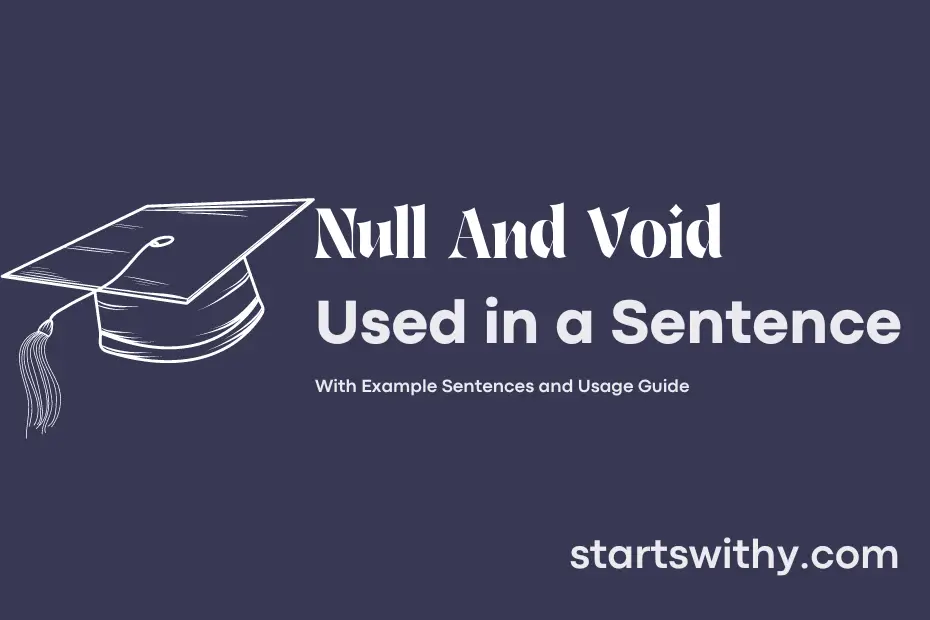Have you ever heard the phrase “null and void” but were unsure of its meaning? Essentially, when something is deemed “null and void,” it is considered invalid or without legal force. This term is commonly used in legal contexts to indicate that a contract, agreement, or other document is no longer effective or enforceable.
In simple terms, if a document or agreement is declared null and void, it is as if it never existed in the eyes of the law. This declaration typically arises when certain conditions or requirements within the document have not been met or if the agreement is found to be unlawful. Understanding the concept of something being “null and void” is important in legal matters to determine the legitimacy and enforceability of contracts and agreements.
7 Examples Of Null And Void Used In a Sentence For Kids
- My broken crayon is null and void because it can’t be used.
- The empty candy wrapper is null and void because there is no candy inside.
- The torn paper is null and void because it cannot be written on.
- The empty bottle is null and void because there is no water in it.
- The missing puzzle piece is null and void because the puzzle cannot be completed.
- The expired milk is null and void because it cannot be drank.
- The deflated ball is null and void because it cannot be played with.
14 Sentences with Null And Void Examples
- Null and void are any late submission of assignments beyond the deadline.
- The exam paper will be considered null and void if any student is caught cheating during the examination.
- Any changes made to the timetable without official approval from the college authorities will be deemed null and void.
- The scholarship application will be rendered null and void if any false information is provided.
- Any unauthorized use of electronic devices during exams will result in the candidate’s test being declared null and void.
- The agreement made without the presence of a witness will be considered null and void.
- Any attempt to tamper with the attendance records of classmates will be considered null and void.
- Failure to adhere to the college’s code of conduct may result in disciplinary action including making the student’s enrollment null and void.
- Any alterations to the terms of a contract without mutual agreement will render it null and void.
- The license granted to use the college facilities will be revoked if the user breaches any of the terms, making it null and void.
- The election results will be declared null and void if any form of malpractice or manipulation is detected.
- The scholarship obtained through dishonest means will be declared null and void.
- Any changes to the exam schedule without prior notification will be deemed null and void.
- The registration for a course will be considered null and void if the necessary fees are not paid by the deadline.
How To Use Null And Void in Sentences?
Null And Void should be used to indicate that something is invalid or without legal force. It can be used when talking about contracts, agreements, decisions, or actions that are considered to have no effect or value.
For example, “The court declared the contract Null And Void due to a breach of terms.” This means that the contract is now considered legally invalid and has no effect.
To use Null And Void in a sentence, simply place the phrase before the subject that is being declared invalid. It’s important to remember to capitalize the first letter of each word and separate them with spaces.
Here are a few more examples of how you can use Null And Void in a sentence:
- “The agreement was deemed Null And Void by the authorities.”
- “The decision to terminate the lease was declared Null And Void by the judge.”
- “Any attempt to change the terms of the contract without proper authorization will render it Null And Void.”
By incorporating Null And Void into your sentences correctly, you can clearly communicate that something is considered to have no legal effect. Remember to use it when discussing situations where something is being declared invalid or without force.
Conclusion
In legal terms, when something is deemed “null and void,” it is considered to be invalid or without legal force. This phrase is used to declare that a contract, agreement, or action is completely ineffective and has no legal standing. For example, if a contract is found to be based on fraudulent information, it may be declared null and void by a court.
Understanding the concept of null and void is important in legal matters to ensure that agreements or actions are legally enforceable. When something is declared null and void, it is as if it never existed in the eyes of the law, and parties involved are released from any obligations outlined in the agreement. It is crucial to carefully review and understand the terms of any legal document to avoid the risk of having it declared null and void.



